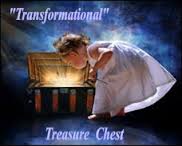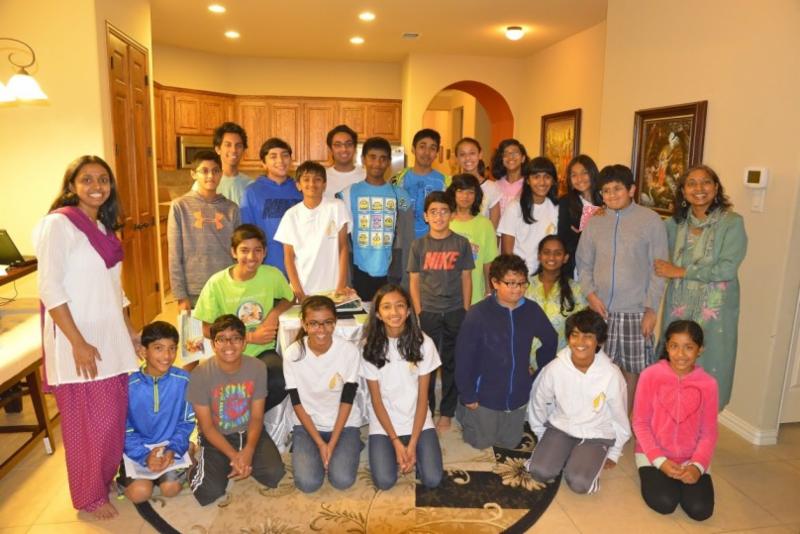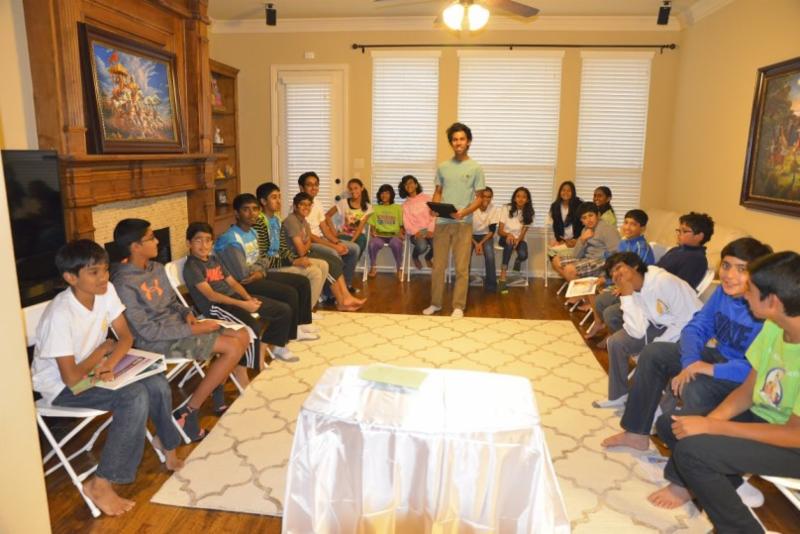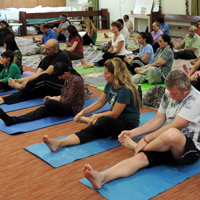From the Editor's Desk | Before we perform any action, we always ask ourselves - "What's in it for me?  Do I derive happiness out of it?" To act with the purpose of obtaining happiness is our innate nature, which we inherit from our Eternal Father. Out of His causeless mercy, our Father has bestowed upon us this precious human form and valuable time, along with free will. Every moment of human life is invaluable. The question is - are you led astray by the worldly temptations and busy collecting the insignificant trinkets, or are you striving for the eternal treasure that we can inherit from our Father? Read on to find out. |
.gif) | Bhakti Ras
Pursue the Eternal Treasure  While invading India, Alexander the Great met a sadhu (a holy man) one day. He approached the sadhu who was watching the sunset, and standing in front of him, declared, "I am Alexander the Great." While invading India, Alexander the Great met a sadhu (a holy man) one day. He approached the sadhu who was watching the sunset, and standing in front of him, declared, "I am Alexander the Great."
The sadhu, without casting a glance at Alexander, said, "Move aside, you are obstructing the sun rays. And I don't think you are great, because a great person doesn't boast of his greatness."
Offended, Alexander the Great pulled out a map and showed the sadhu all the kingdoms he conquered until then, and pointing to the water pot sitting next to the sadhu, he asked, "My army has been marching through the desert and we are thirsty. Can you give us some water?"
With a tranquil gaze, the sadhu said, "Since you have conquered all those kingdoms, if you give me half a share of all those lands, I will give you a half pot of water. If you hand me off all the kingdoms you conquered, you can have the whole pot of water." Listening to the sadhu's words, Alexander stood perplexed.
The sadhu continued in a placid manner, "You wasted your life for a pot of water. Don't you see, you threw away your whole life conquering all those kingdoms while you need only six feet?"
Contemplating on these wise words of the sadhu, Alexander began marching back home. Later, when he fell ill and knew that death was fast approaching, Alexander asked his generals to carry out his three instructions after his demise - his physicians to carry his coffin, to strew the path leading to the graveyard with all the wealth from his treasury, and to leave both of his hands dangling out of his coffin.
Wonder why Alexander gave these instructions? To let everyone know that no doctor can save anyone from the clutches of death, chasing earthly pleasures and accumulating materialistic goods is a waste of time, and that we came empty-handed and shall leave empty-handed. A poet has put this point across very well:
दुनिया मे खूब् कमाय क्या हिरे क्या मोति । लेखिन् क्या करें यारों, कफ़न् में जेब् नहीं होति।। duniya me khuub kamaaya kya hire kya moti । lekhin kya kare yaro, kafan me jeb nahii hoti ।।
"Earned a lot of fortune and wealth in this world, but alas, my friends, there are no pockets in the shroud!"
In fact, our own gross body does not come with us. Yet, in our ignorance, we chase the mirage of Maya (material energy,) seeking the short-lived pleasures and happiness in its animate and inanimate objects. When our five senses - sight, smell, taste, touch, and hearing - meet their objects of perception, it leads to either happiness or anguish. Neither of these sensations is permanent, and they alter like the changing seasons, says Shree Krishna in Bhagavad Gita.
Therefore, it is of vital importance to remember always that the worldly pleasures and happiness neither gratify us nor follow us on our departure from this world.
On the other hand, there is one transformational treasure chest - bhakti (devotion). This treasure accompanies us in time and eternity, and the bliss derived from bhakti is everlasting. How is that so? It is because our Eternal Father, from whom we inherit this treasure, is an ocean of bliss. Taittiriya Upanishad states:
आनंदो ब्रह्मेति व्याजानात ānando brahmeti vyajānāt (3.6) "Know God to be bliss."
Our scriptures and saints proclaimed repeatedly that the bliss of God is everlasting, never-ending, and ever fresh. However, to receive His sublime jewels of bliss, we need to cleanse our heart. And bhakti alone can do that. It is only when we tether our mind to His feet and serve Him under the guidance of a guru, we start garnering the divine treasure, which is eternal and transformational. |
.gif) | .gif) | Inspirations for Living
Start the Treasure Hunt Early and Speed it up a Notch  When do we start pursuing the spiritual treasure? From the very beginning of our life, as one of the greatest devotees, Prahalada has professed. While Prahalada was a child, his father Hiranyakasipu sent him to Sanda and Amarka, Sukracharya's two sons, to be educated. One day while the teachers were away from the gurukul, and when the other boys asked Prahalada to join them in games and leisurely play, Prahalada said: कौमार आचरेत् प्राज्ञो धर्मान् भागवतान् इह । दुर्लभं मानुषं जन्म तद् अप्य् अध्रुवम् अर्थदम् ॥ kaumāra ācharet prājño dharmān bhāgavatān iha durlabhaṁ mānuṣaṁ janma tad apy adhruvam arthadam (Bhagavatam 7.6.1) "One who is intelligent must begin practicing the principles of devotion from childhood itself. This human body, although temporary like other bodies, is rarely achieved and meaningful." His friends, reluctant to give up play, responded, "But, Prahalada, we are still children and very young. We have many, many, more years ahead of us." To which Prahalada said, "We humans have hundred years of life, but half of those years are lost due to our sleep and ignorance; so we shouldn't waste any more time. Moreover, our life is transient and at any moment, it might ebb away. There is no guarantee that we will live through hundred years." Convinced, all the boys in the gurukul joined Prahalada in Hari nama sankirtan. Therefore, when it comes to pursuing the eternal treasure - bhakti - it is never too early to start. As the wise say, "better three hours too soon than a minute too late." Many of us have a misconception that spiritual life is indeed only for the aged and retired people, but when we become old, the age-related ailments do not permit us to do sadhana. Besides, we think we have time, not knowing when our time is going to end. No one is too busy for sadhana; it is all about our priorities and choices. The Vedas refer to two paths - preya (pleasant) and shreya (beneficial) - that lead us to different goals. We choose preya when we consider ourselves as the body, pursue the worldly fortune, and become bitter when it diminishes. On the other hand, when we choose shreya, although unpleasant in the beginning, opens up the path to move faster toward the eternal treasure. Therefore, it is up to us how soon we embark on this path and how fast we go through the trail that leads to the eternal treasure! |
.gif) | .gif) | Bal-Mukund: Playground for Vedic Wisdom First We Form Habits, Then They Form Us In a fishing village on the southern coast of India, there once lived a fish vendor. Her name was Meena. Every day, Meena used to fill a basket with the fish that her husband caught, walked to the neighboring town to sell, and returned home by dusk. One late evening, after going door-to-door selling all the fish, she was returning home. Suddenly it began to rain, so Meena ran to the porch of a small hut to take shelter. Soon, it was getting dark and the rain was pouring down in torrents. A woman peeked out of the hut's slanted door, and invited Meena to come in. She offered Meena a hot bowl of rice porridge, and handing her a mat she said, "It's too late to walk back to your village; rest here tonight."
Meena looked around the small hut and realized that the woman was a flower vendor. There were two baskets filled with marigolds and jasmines along one side of the wall and a couple of garlands hanging from the thatched roof of the hut. Meena spread her mat in one corner and lay down, but she could not fall asleep as the fragrance of the flowers filled the hut. After tossing and turning restlessly for an hour, Meena got up, picked her fish basket and the mat, walked out to the porch. She spread the mat on the floor and placed the fish basket close to her head, and drifted off into sleep happily.
Such is the impact of a habit! Meena was around fish all throughout her life and got used to that smell. Therefore, she could not appreciate the sweet fragrance of the flowers. This is how our habits mould us, and we wish to break them.
However, we cannot break an old habit overnight. It takes a habit to break a habit. The solution is to surround ourselves constantly with satsang (good company) and consciously stay in a healthy environment, so that we acquire good habits. |
.gif) | .gif) | Community Events 2016 | New Initiatives
Toastmasters Gavel Club   The Radha Krishna Temple of Dallas has started a new chapter of the Toastmasters called Gavel Club. Youth between the ages 10-18 years are welcome to join the World's most famous Public Speaking Club. Effective communication builds Confidence and builds Leadership skills. The Toastmasters Club molds its members to become eloquent speakers. Click here to get a glimpse of our youth in action. | "Toastmasters is helping me take up leadership opportunities in school with more confidence!" -Nitin Sudarsanam
|
Manjari (Youth Club): (214) 662-2704
Aruna (Toastmasters Club): (860) 796-3205 Little Hands Big Hearts - Radha Krishna Temple Supports
Homeless Children  Through Little Hands Big Hearts, we wish to inspire you to take to heart the plight of needy children in our very own DFW community. Beginning November 30th, 2015 - the day designated by a United Nations Declaration to raise awareness for children's well-being around the world - Radha Krishna Temple has been collecting essential items for the approximately 48,000 children with nothing more than the clothes on their back. A small act of kindness from each of us, coming together in support of these disadvantaged children in the DFW area, can make a world of difference in helping these little hands grab hold of a better future. Collection of essential items will run through February 15, 2016. All items collected will be given to Hope Supply Company, which supports 50 area organizations in serving homeless children throughout five DFW counties.
We are counting on your big hearts for support!
|
|
.gif) | .gif) | Other Ongoing Community Events
For the benefit of the community, The Radha Krishna temple provides abundant opportunities to volunteer and participate in various events. |
 | Weekly Satsangs
These satsangs truly propel one in the ocean of bhakti through a combination of prayer, singing bhajans/kirtans, viewing a video lecture, and followed by arati, and Prasad.
For local satsang information visit: www.radhakrishnatemple.net or info@radhakrishnatemple.net. |
|
|  | | Bhagavad Gita
Study Group | Free Community
Yoga Classes | Vishnu Sahashra
Naam Chanting At: 4020 Sendero Trail
Plano, TX 75024
On: 1st Sat, 3 to 4 PM
Details & Registration |
|
|
 |  'Dollar A Day' - Pledge Continuous Support! Donate a Dollar a Day towards the building and upkeep of the Radha Krishna temple! By donating just $1 everyday,
you'll help this noble cause!
How many of us have the opportunity and are fortunate enough to build a house for God? Set up monthly contributions through credit card/debit card by calling: 860-605-3685 or by visiting temple website at Radha Krishna Temple of Dallas (click). |
|
.gif) | .gif) | Wellness for Life
The keys to the Treasure Chest How can we unlock the divine treasure? We can do it only by purifying, and elevating our thoughts. In other words, we need to cleanse our mind. How do we do that? Bhagavatham enumerates navdha bhakti (nine methods) with which we can purify our mind, thus opening up the treasure chest of bhakti:  - Sravanam - Listening to God's glorious pastimes
- Kirtanam - Chanting His names and eulogizing His traits
- Smaranam - Constantly remembering Him and discerning Him everywhere
- Pāda sevanam - Dedicating all actions at His lotus feet
- Archanam - Worshiping Him
- Vandanam - Prostrating to Him
- Dāsyam - Serving Him
- Sakhyam - Perceiving Him as a friend and well-wisher
- Ātma nivedanam - Surrendering to Him completely
Prahalada learned these nine spiritual practices from Narada Muni. If we sincerely imbibe even one of these, all the others will follow naturally. |
We really want to hear from you. |
|